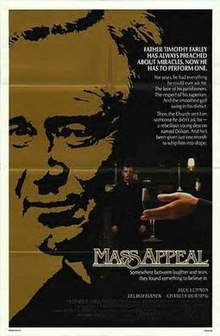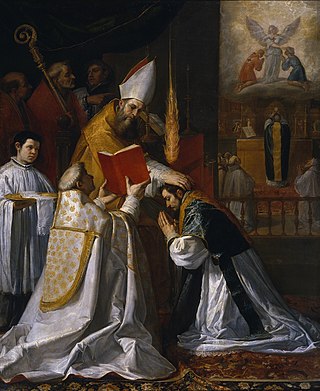
In certain Christian denominations, holy orders are the ordained ministries of bishop, priest (presbyter), and deacon, and the sacrament or rite by which candidates are ordained to those orders. Churches recognizing these orders include the Catholic Church, the Eastern Orthodox, Oriental Orthodox, Anglican, Assyrian, Old Catholic, Independent Catholic and some Lutheran churches. Except for Lutherans and some Anglicans, these churches regard ordination as a sacrament.

A deacon is a member of the diaconate, an office in Christian churches that is generally associated with service of some kind, but which varies among theological and denominational traditions.
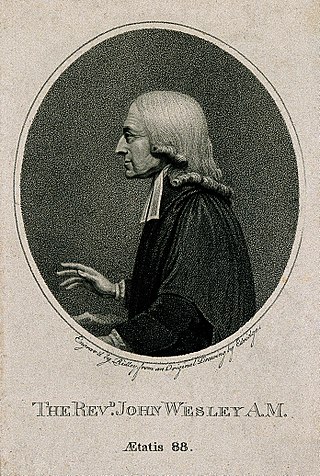
The Reverend is an honorific style given before the names of certain Christian clergy and ministers. There are sometimes differences in the way the style is used in different countries and church traditions. The Reverend is correctly called a style, but is sometimes referred to as a title, form of address, or title of respect. The style is also sometimes used by leaders in other religions such as Judaism and Buddhism.

A pastor is the leader of a Christian congregation who also gives advice and counsel to people from the community or congregation. In Lutheranism, Catholicism, Eastern Orthodoxy, Oriental Orthodoxy and Anglicanism, pastors are always ordained. In Methodism, pastors may be either licensed or ordained.

In Christianity, a minister is a person authorised by a church or other religious organization to perform functions such as teaching of beliefs; leading services such as weddings, baptisms or funerals; or otherwise providing spiritual guidance to the community. The term is taken from Latin minister. In some church traditions the term is usually used for people who have been ordained, but in other traditions it can also be used for non-ordained.
The canon law of the Roman Catholic Church does not allow for homosexuals to be ordained. The church requires that clerics "observe perfect and perpetual continence for the sake of the kingdom of heaven"; for this reason, priests in Roman Catholic dioceses make vows of celibacy at their ordination, thereby agreeing to remain unmarried and abstinent throughout their lives. However, as well as this vow of celibacy, the 1961 document entitled Careful Selection and Training of Candidates for the States of Perfection and Sacred Orders states further that homosexual men should not be ordained at all.
The hierarchy of the Catholic Church consists of its bishops, priests, and deacons. In the ecclesiological sense of the term, "hierarchy" strictly means the "holy ordering" of the church, the Body of Christ, so to respect the diversity of gifts and ministries necessary for genuine unity.
Ecclesiastical titles are the formal styles of address used for members of the clergy.

Martin David Holley is an American prelate of the Catholic Church. He served as bishop of the Diocese of Memphis in Tennessee, from 2016 to 2018, when he was removed by Pope Francis for alleged mismanagement of the diocese.
Mass Appeal is a two-character play by Bill C. Davis. The comedy-drama focuses on the conflict between a complacent Roman Catholic pastor and the idealistic young deacon who is assigned to his affluent, suburban parish.
In the Catholic Church, a parish is a stable community of the faithful within a particular church, whose pastoral care has been entrusted to a parish priest, under the authority of the diocesan bishop. It is the lowest ecclesiastical subdivision in the Catholic episcopal polity, and the primary constituent unit of a diocese or eparchy. Parishes are extant in both the Latin and Eastern Catholic Churches. In the 1983 Code of Canon Law, parishes are constituted under cc. 515–552, entitled "Parishes, Pastors, and Parochial Vicars."
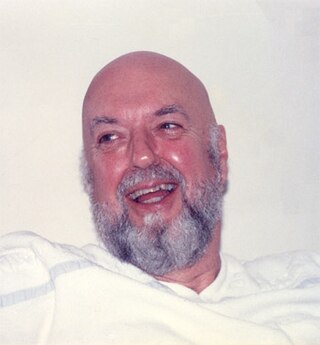
Monsignor John Arthur Trese was an American Catholic priest serving the Archdiocese of Detroit from 1951 to 2000.
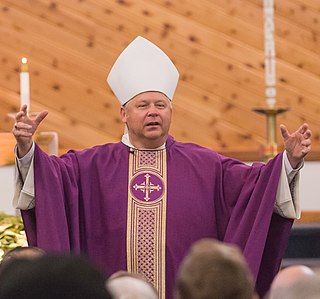
Richard Frank Stika is an American prelate of the Catholic Church who served as the third bishop of the Diocese of Knoxville in Tennessee from 2009.

Robert Eric Guglielmone is an American prelate of the Roman Catholic Church, who served as bishop of the Diocese of Charleston in South Carolina from 2009 until 2022.
This is a glossary of terms used within the Catholic Church. Some terms used in everyday English have a different meaning in the context of the Catholic faith, including brother, confession, confirmation, exemption, faithful, father, ordinary, religious, sister, venerable, and vow.

The Church of the Sacred Heart of Jesus is a Roman Catholic parish church, located in Hell's Kitchen/Clinton, Manhattan, New York City. Founded in 1876, it is a parish of the Archdiocese of New York and is located at 457 West 51st Street. Sacred Heart of Jesus School is located at 456 West 52nd Street.
The Church of St. Mary is a Roman Catholic parish church under the authority of the Roman Catholic Archdiocese of New York, located in Wappingers Falls, Dutchess County, New York. It was canonically established in 1845.
The Old Church of St. Rose of Lima is a former Roman Catholic parish church which was under the authority of the Roman Catholic Archdiocese of New York, located at 36 Cannon Street between Broome Street and Delancey Street in the Lower East Side of Manhattan, New York City. The rectory was located at 42 Cannon Street; the school was located at 290 Delancey Street. The 1871 church was described by The New York Times when it opened in 1871, as one of the finest churches in the city. The church was demolished around July 1901 and the site redeveloped in conjunction with the erection of the Williamsburg Bridge (1903) and public housing. A new church was begun shortly after property was purchased in July 1900 at Grand and Lewis Streets. The parish closed in the 1960s.
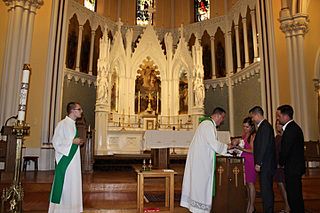
St. Mary of the Assumption Church is a parish of the Roman Catholic Church in Dedham, Massachusetts, in the Archdiocese of Boston.

Saint Stephen Martyr Catholic Church is a Catholic parish church located at 2436 Pennsylvania Avenue NW in Washington, D.C., in the United States. The parish was founded on August 4, 1867, and the first church building consecrated and used for worship on December 27, 1868. This brick structure closed on July 15, 1959, and the current new building was consecrated and first used for worship on June 11, 1961. The church was a favorite of President John F. Kennedy.
